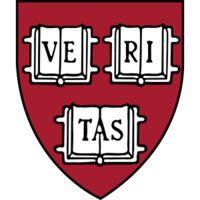Harvard University

- Country
- 🇺🇸United States
- Ownership
- Private
- Established
- 1636-09-08
- Employees
- 10K
- Market Cap
- -
- Website
- http://www.harvard.edu
Clinical Trials
52
Trial Phases
3 Phases
Drug Approvals
0
Drug Approvals
No drug approvals found
This company may not have drug approvals in our database
Clinical Trials
Distribution across different clinical trial phases (51 trials with phase data)• Click on a phase to view related trials
Testing the Effects of Project Calm in Ukrainian Schools
- Conditions
- AnxietyDepressionTraumaChild Behavior
- First Posted Date
- 2024-01-22
- Last Posted Date
- 2024-08-13
- Lead Sponsor
- Harvard University
- Target Recruit Count
- 728
- Registration Number
- NCT06217705
- Locations
- 🇺🇸
Harvard University, Cambridge, Massachusetts, United States
Brief Interventions on Social Media to Reduce Suicide Risk (Intervention 2)
- Conditions
- Mental Health IssueStigma, Social
- First Posted Date
- 2023-11-02
- Last Posted Date
- 2025-08-13
- Lead Sponsor
- Harvard University
- Target Recruit Count
- 10000
- Registration Number
- NCT06114862
- Locations
- 🇺🇸
RallyPoint Networks, Inc, Boston, Massachusetts, United States
Brief Interventions on Social Media to Reduce Suicide Risk (Intervention 3)
- Conditions
- Distress, EmotionalSuicide
- First Posted Date
- 2023-11-02
- Last Posted Date
- 2025-08-13
- Lead Sponsor
- Harvard University
- Target Recruit Count
- 29
- Registration Number
- NCT06114849
- Locations
- 🇺🇸
RallyPoint Networks, Inc, Boston, Massachusetts, United States
Brief Interventions on Social Media to Reduce Suicide Risk (Intervention 1)
- Conditions
- SuicideDistress, Emotional
- First Posted Date
- 2023-11-02
- Last Posted Date
- 2025-08-13
- Lead Sponsor
- Harvard University
- Target Recruit Count
- 942
- Registration Number
- NCT06114875
- Locations
- 🇺🇸
RallyPoint Networks, Inc, Boston, Massachusetts, United States
The Ukrainian Student Problem Solving Project
- Conditions
- TraumaAnxietyChild BehaviorDepression
- First Posted Date
- 2023-10-03
- Last Posted Date
- 2024-08-13
- Lead Sponsor
- Harvard University
- Target Recruit Count
- 778
- Registration Number
- NCT06064578
- Locations
- 🇺🇸
Harvard University, Cambridge, Massachusetts, United States
- Prev
- 1
- 2
- 3
- 4
- 5
- 10
- Next
News
Nilo Therapeutics Emerges from Stealth with $101 Million to Develop Neural Circuit-Based Immunomodulation Therapies
Nilo Therapeutics launched with $101 million Series A financing led by The Column Group, DCVC Bio, and Lux Capital to develop a new class of medicines targeting neural circuits in immune diseases.
Patient-Derived Esophageal Cancer Organ Chips Accurately Predict Chemotherapy Response in Clinical Study
Researchers developed patient-specific esophageal adenocarcinoma organ chips that accurately predicted chemotherapy responses in all eight patients tested, overcoming limitations of traditional organoid models.
XtalPi Secures $100 Million Partnership with Harvard's Gregory Verdine to Advance AI-Driven Drug Discovery
XtalPi has signed a Letter of Intent with DoveTree LLC, founded by Harvard Professor Gregory Verdine, for a collaboration worth $100 million upfront plus potential milestone payments exceeding $10 billion.
Catalyst Pharmaceuticals Appoints Dr. William Andrews as Chief Medical Officer to Lead Rare Disease Strategy
Catalyst Pharmaceuticals appointed Dr. William T. Andrews as Chief Medical Officer, succeeding retiring Dr. Gary Ingenito after his successful 10-year tenure with the company.
Brooklyn Health Raises $6.5M to Transform CNS Clinical Trial Measurement with AI-Powered Platform
Brooklyn Health secured $6.5 million in seed funding led by HealthX Ventures to advance its AI-powered clinical trial measurement technology for central nervous system disorders.
Federal Circuit Remands CRISPR Patent Dispute to PTAB in Ongoing Editas Medicine Case
The U.S. Court of Appeals for the Federal Circuit has partially vacated the Patent Trial and Appeal Board's previous decision in the CRISPR/Cas9 patent interference case, remanding it for further review.
Trump Administration's Clinical Trial System Shutdown Shocks Medical Research Community
The Trump administration issued an unexpected "stop work order" for SMART IRB, a critical system that streamlines multisite clinical trials, leaving researchers across the country baffled.
Vizgen Settles Litigation with 10x Genomics and Harvard, Secures Future for MERFISH Technology
• Vizgen has reached a settlement agreement with 10x Genomics and Harvard University, ending litigation in both U.S. and European courts after three days of trial in Delaware. • The resolution secures Vizgen's freedom to operate its MERFISH technology, allowing the company to continue building its intellectual property portfolio in spatial biology without legal impediments. • Since introducing MERSCOPE in 2021, Vizgen's technology has been featured in over 300 scientific publications spanning neurodegenerative disease, oncology, and other research fields.
Artis BioSolutions Launches with Landmark Bio Acquisition to Transform Advanced Therapy Manufacturing
Artis BioSolutions has emerged from stealth mode with the strategic acquisition of Landmark Bio, positioning itself as a premier CDMO for advanced genetic medicine development.
Harvard-Licensed Antibiotic Platform Launches as Kinvard Bio to Combat Drug-Resistant Infections
Kineticos Life Sciences launches Kinvard Bio to develop novel oxepanoprolinamide antibiotics, licensed from Harvard University's Myers Lab, targeting multi-drug resistant bacterial infections.
